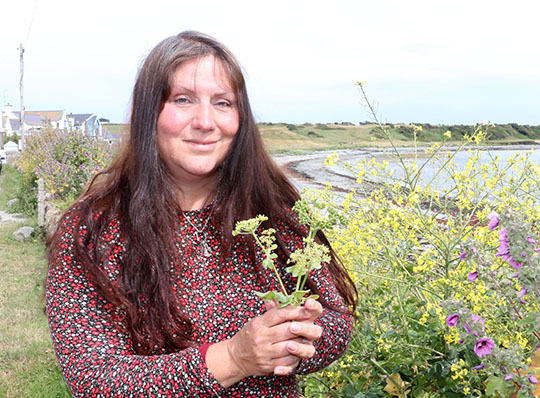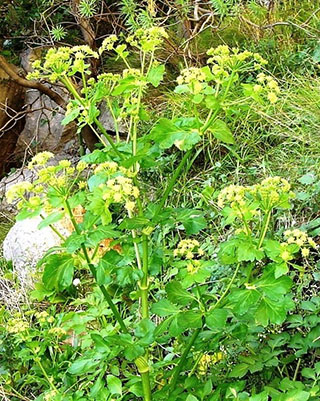Helen Hastings writes on food in the coronavirus times and chats to top forager Alison McGrenaghan.
Isn’t it great to see pasta coming back into the shops again writes Helen Hastings.
With the recent coronavirus panic buying and stockpiling obsession slowly starting to calm down, I have started to view certain foods in a completely different light.
Back in March I can remember having the fleeting but horrifying thought that a pasta shell would become just an artist’s impression in the history books of the future.
One day at the height of the stockpiling chaos, I went into my local shop and found what just might have been the last remaining bag of macaroni in County Down.

I ran out of the shop cautiously looking over my shoulder for the angry hoard that I was so sure was going to be on my tail. I decided that being wrestled to the ground and smashed over the head with a jar of Ragu would be a pretty stupid way to die.
Another day I watched with amazement as a huge consignment of pasta and toilet roll was carefully rolled into another local shop. The young shop assistant had a look of abject terror on his face as he replenished the shelves. “Should you not be under armed guard?” I joked. He did not find this at all funny.
“It’s a mirage” I said to a customer as they looked at the starchy goods, their eyes glazed over and a wee shiny globule of drool at the corner of their mouth. “It’s not really there you know”, I was really enjoying myself at this point “We’ve all gone insane and there’s no way back!”. I got out of there pretty quickly before they had a chance to get their pitchforks!
All joking aside, I think we have all gone borderline insane with the coronavirus epidemic, and the heart of that insanity was found in our supermarkets. We all watched the You Tube videos of people fighting over food and stared in awe at the sight of empty shelves. It was a terrifying time and it brought out the worst in a lot of people.
I found myself meditating on our varying new attitudes to food and it has made me realise just how focused we have all become on supermarkets. They are of course the mecca when it comes to convenience, but a lot of people seem to have lost touch with the sense of community and resourcefulness of the old ways when it comes to food.
Helen Hastings Chats To Forager Alison McGrenaghan.
Foraging is on the up with more and more people taking an interest in ‘wild food’ and I don’t think it has ever meant more to the people who really take pleasure in taking direct from the Earth.
In this article, our foraging expert Alison McGrenaghan who lives in County Down will tell us all about the magic of ‘Alexanders‘ or “sea parsley” as it is sometimes called.

Alexanders are a much lesser known plant especially to those who are just starting out with foraging; can you give us a brief outline? What exactly are people looking out for?
You will all definitely have seen this plant, even if you haven’t realized it, as it is common along many hedgerows and roadside verges. It is a coastal plant, but once established, seems happy enough to grow inland as well.
It is tall too, up to 1.5 m high, although more typically between 90 cm and 120 cm. It has attractive, small greenish-yellow flowers, which are arranged in umbels – which mean that the small individual flowers branch out on tiny stalks, creating a spherical or hemispherical effect.
The leaves are bright green and toothed, arranged in groups of three at the end of the leaf stalk and the main stem is thick and somewhat resembles celery. The entire plant has an almost spicy smell to it, Alexanders, showing the yellow green umbels
So, I asked Alison, The sea is a very special place to be anyway, so can you tell us about the magic of seaside foraging and the benefits?
Well for me personally the main benefit is the possibility of combining the foraging trip with some wild swimming, but I know that won’t appeal to everyone. It also means the possibility of fishing or shell-fish gathering (remembering ecological responsibilities) and seeing as seafood is my absolute favourite; it definitely counts as magic in my book.
Once on the beach, or along the side of it, you don’t have to worry about cars etc. coming along which is great, also the season for some seashore foraging starts earlier than inland foraging, for example, sea beet. The sea air is, of course, fantastic too.
Safety first Alison, so give us all the dos and don’ts of wild food foraging by the sea.
Any seashore activity demands common sense. Check the tides before you go and pick a beach that isn’t dangerous in terms of tides, cliffs etc. Wear suitable clothing, particularly footwear. Remember that even when it is roasting inland a sea breeze can make it nippy enough along the shoreline, so wear layers.
Go with others, or at the very least let someone know where you are going and when you plan to be back. Take great care clambering over rocks etc. they can be very slippery and wash everything on your return – dogs pee on the beach as well as in the countryside.
What are your favourite recipes for Alexanders?
Hugh Fearnly-Whittingstall recommends steaming the shoots and serving them as an early spring vegetable with butter, salt and pepper. I have also recently come across a recipe for Alexander Spring Rolls, which I must try out at some point, as they sound interesting. My own personal favourite is soup – the recipe is below.
Alexanders Soup Recipe
Ingredients:
Olive oil
I large parsnip
1 Large potato
4 – 6 upper stems of Alexanders
1 bunch of spring onions
Good stock – either vegetable or chicken around 1 pint
½ pint of full fat milk
Salt and black pepper
Cream to serve (optional)
Method
Finely chop the vegetables and sweat them in the oil. Add the salt and black pepper to taste. Then add the stock and simmer till tender, around 20 minutes. Then pour in the milk and adjust the seasoning. Allow to cool. Blend, then re-heat and add the cream before serving.
Are there any spiritual or magical connections to this plant that have been handed down through the centuries, including medicinal purposes?
The plant was first introduced by the Romans. They knew it as the ‘pot herb of Alexandria’ hence our name for it, “Alexanders.” Roman soldiers would carry the plant on long journeys, as they could eat every part of the plant
They were used in medieval cuisine in place of celery. In fact up to the early modern period we find references to “vernal pottage” and “lentern pottage” containing alexanders. However they seem to have fallen out of favour by the 18th century.
Traditionally they have been used in herbalism and Chinese medicine, for cleansing the blood and as a digestive. Sailors were also believed to use it to treat scurvy.
Interestingly, I know of no magical associations or folklore pertaining to this plant and whilst researching this article I had a good look, but still could find nothing. All of which makes me wonder if typically our magic and folkloric traditions stretch back to before the Roman invasion.
There has been a huge upsurge recently in foraging and growing your own veg, do you think the current situation is lending itself to that? And if so, do you think it’s mainly a hobby for folks or do you think that some people are slowly losing faith in mainstream supermarket shopping?
Yes, things really seemed to take off in the “grow your own” and “foraging” camps as lockdown kicked in didn’t they! To be honest I think it is a latent element that exists within all of us, it’s instinctual, biological.
We are designed to hunt, gather and grow our food. I know there is a bit more work in it, or maybe not when you consider how mad the shops were at the beginning of the current crisis, but it is so satisfying and much more pleasurable than queuing beneath the strip lighting in a supermarket. For most people, it will probably be an experimental dalliance, but there will be some who will embrace it on a more serious level.
























